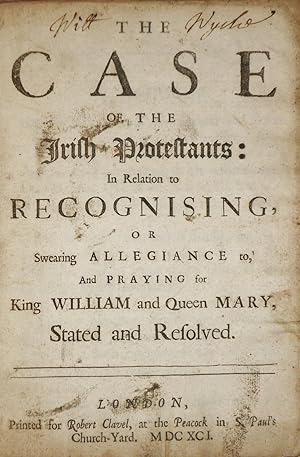About this Item
small 4to., 26pp + 1 ad leaf, some occasional contemporary light soiling to title, with light old stain to extreme lower margins unaffecting any text, professionally rebound in late twentieth century quarter calf over marbled boards with title label to upper cover blocked in gilt. A VG copy of this rare item by Edward Wetenhall. (Wing W1490; Sweeney 5595). Edward Wetenhall (1636 1713), Church of Ireland bishop of Cork and Ross, and later of Kilmore, was born 7 October 1636 in Lichfield, Staffordshire, England; no details of his parents are available. He was initially educated at Westminster School, being admitted as a King's scholar in 1651. From there he went to Trinity College, Cambridge, which he entered as a foundation scholar (1655), graduating BA (1658). In 1660 he transferred to Lincoln College, Oxford, where he was incorporated BA (1660) and MA (1661). Wetenhall held a number of posts during his time at Oxford, including curate of Longcombe, Oxfordshire, and vicar of St Stephen's parish, Hertfordshire. In 1672 he was invited to Ireland by Archbishop Michael Boyle to be master of the Blue Coat School. He also held a number of other posts in Dublin, including the curacy of St Werburgh's parish and two prebendaries in St Patrick's, those of Tasagart and Castleknock. On 14 February 1678, after being nominated by the Duke of Ormond as a man exceedingly well qualified for the function, he was appointed Bishop of Cork and Ross in succession to Edward Synge, being consecrated on 23 March 1679. In this office he busied himself improving the diocese, repairing the bishop's palace at his own expense, and recovering lands that had been alienated from the church's possession. Wetenhall's other activities at this time are characterised by a concentration on catechising and a tolerance for dissenting protestants, though he continued to insist on the supremacy of the anglican communion. By the early 1680s Wetenhall had attracted the admiration of the earl of Arran, lord deputy, who recommended in 1682, and again in 1683, that Wetenhall be considered for the archbishopric of Cashel when it fell vacant. Likewise, Archbishop Boyle proposed that he be translated to Elphin in 1684, though this was partly motivated by Wetenhall's having angered some of the local gentry in his diocese. In 1684, when the archbishop of Cashel did die, some proposed that Wetenhall be appointed archbishop of Tuam. None of these proposals bore fruit, and Wetenhall continued to be bishop of Cork throughout the reign of James II. During the Williamite war Wetenhall remained in Ireland, being one of four Church of Ireland bishops who attended James II's parliament. Subsequently he was imprisoned by the Jacobites in Cork in September 1690. After the war Wetenhall published anonymously The case of the Irish Protestants in relation to recognizing or swearing allegiance to and praying for King William and Queen Mary stated and resolved (1691). This work, influenced by anglican arguments emanating from England, assigned William of Orange the role of a protestant saviour sent by Providence and defended protestant participation in the glorious revolution on the grounds that James II had forfeited his right to loyalty by his actions, though it claimed that Irish protestants had only taken a passive part in the events. Despite this he was suspected by some of having pro-Jacobite sympathies. He continued in office, nonetheless, and on the day of commemoration of the 1641 rebellion he preached an anti-catholic sermon to the Irish parliament in 1692. From 1691 to 1697, furthermore, he took on the role of Archdeacon of Cork in commendam. Wetenhall died in London, where he spent his final years, on 12 November 1713. He was survived by his second wife, Philippa (d. 1717), sixth daughter of Sir William D'Oyly of Kent, and by his sons by his first marriage. Edward Wetenhall was buried in Westminister Abbey.
Seller Inventory # 3761
Contact seller
Report this item



